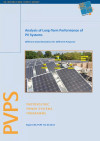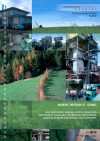Publications
There are 686 results.
Innovative Energy Technologies in Austria Market Development 2014

The market development of the examined technologies was restrained or marked by decreasing figures in 2014. An exception was the area of wind power. The use of solid biogenous fuels was reduced in 2014 due to an exceptionally mild heating period. The sum of the heating degrees for 2014 war 21 % less than the longtime average.
English
Technical status of ventilation systems for buildings

Evaluation of existing ventilation systems in Austria considering technical quality and practicability.
Science documentary "Building of Tomorrow" for television

The documentary film for ORF/ 3sat and Bayern alpha-TV presents the concept of the passive house. Fascinating pioneer projects of the Austrian Program on Technologies for Sustainable Development, Sub-Program "Building of Tomorrow", have been filmed over several months. The importance of taking care of ecology and sustainability when constructing houses is demonstrated to a large audience.
Brochure: 10 years of the program "Building of Tomorrow"

Examples of innovative construction methods for new building and for renovation.
International eco-label for sustainable building products

Standardisation of testing criteria of acknowledged eco-labels in co-operation with the specialised trade for building products.
Innovative moth-protection system for sheepwool insulation

This project developed a novel "bio-pesticide"-formula by screening plant extracts and minerals for their strong repellant activity in order to protect sheepwool insulation from cloth moth infestation. It was investigated and examined by state-of-the-art-technology that the anti-moth-mixture extracted from plants and minerals, acts as a valid alternative to existing pest control agents.
Design Guidelines - Solar Space Heating of Factory Buildings

This booklet presents a method to design solar thermal systems for space heating of factory buildings using underfloor heating systems.
Analysis of Long-Term Performance of PV Systems

IEA-PVPS Task 13, May 2014
Publisher: IEA Photovoltaik Power Systems Programme
English, 60 pages
Publication Downloads
"Energy saving" - the best PR strategy for sustainable housing?

The project aim is the clarification and PR-reevaluation of the thematic field "energy/energy saving" as a chance to study users and market forces close and factual to have a secure base for the development of new concepts, slogans and incentives in Austria.
"1000 Passivehouses in Austria" - Passive house object databank

The first joint project of the four IG passive house organisations on behalf of the programme line "Building of Tomorrow" - an initiative of the Federal Ministry for Transport, Innovation and Technology - for the purpose of setting up a detailed network documentation of 80% of all passive houses in Austria.
MODESTORE - Modular High Energy Density Sorption Heat Storage

Seasonal storage of solar heat for use in low energy and passive houses (new buildings as well as old buildings).
Transfer initiative - The future belongs to the passive house

Developing the passive house standard from pilot projects to a common standard in housing projects with an optimum of comfort. Comprehensive transfer initiative of the passive house standard by fairs, exhibitions and lobbying activities in communities.
Service packages for the ecological renovation of buildings

Services for a comprehensive ecological renovation should comprise advice, design and construction as well as "green" building assessment and innovative financing models. Such services are developed together with companies in the construction business and tested in pilot projects.
Model region Güssing

Development of modular parts for clay-passive houses

Development of extensive storey-high modular parts made of renewable primary products (wood, straw, hemp) for clay-passive houses.
What is so beautiful about the own home - a life-style concept of housing

Motives behind the wish of living in a certain way - here, especially in a detached house - explained through a life-style concept
First rehabilitation project of a public building to reach passive-house standard

General rehabilitation of the General Secondary School II and the Poytechnic School at Schwanenstadt (Upper Austria) using prefabricated timber wall elements and a newly developed ventilation system optimised for schools
green LIGHT: light, fresh air, exterior space, greening in the large volume PassivHaus

theoretical topics: Optimization of natural light, ambient humidity and of private exterior space, planted over buildings, evaluation of the energetic performance and special challenges of large volume "Passivhaus" residential buildings. applied research: concept for the renovation of a 13 storey residential building for senior citizens built in 1974 to PassivHaus standards, applying the results attained in the theoretical part.
Competence- and knowledge centre of renewable energies and passive house technology

Arrangement of a passive house village for test living in the context of an innovative settlement expansion. Building up a large dimensioned passive house for consulting, training, exhibitions, research and distribution of passive house technology and know-how in the field of energy efficient and sustainable building.
